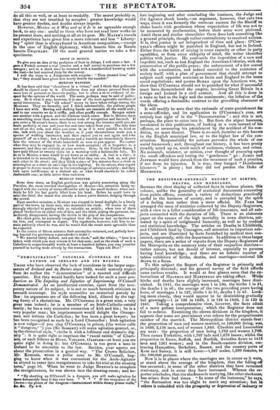"DEMONSTRATION" TOUCHING O'CONNELL BY TILE AUTHOR OR IRELAND AND ITS
RULERS.
Taose who have observed the lack of soundness in the larger argu- ments of' Ireland and its Rulers since 1829, would scarcely expect from its author the " demonstration " of a mooted and difficult question. But they would hardly have looked for such a poor pro- duction as The Impolicy and Injustice of Imprisoning O'Connell Demonstrated. As an intellectual exercise, apart from the tem- porary nature of its subject, it is not so much beneath criticism as beneath contempt. Its style resembles an- oratorical parody by Boo: its arguments are of the following kind, diluted by the tag- rag finery of a rhetorician. Mr. O'Cortrimr. is a great man, a very great man indeed ; he is a member of an Irish-Catholic-estuted family ; he has a very extensive connexion of kith and kin; • he is a very popular man ; his imprisonment would delight the Orange- men and irritate the Catholics ; he has been a great lawyer; he has been recognized as such by a Lord Chancellor: Irish agitation is now vulgar—if you clap O'Cortaierm in prison, (the writer calls
"dungeon,'") you (Sir ROBERT) will make agitation genteel, or, in the rhetorical style, "clothe it with a loftiness and dramatic dig- nity ": it is quite right to imprison the "rascal rabble" of Chart- ists, or such fellows as HUNT, VINCENT, 0.4.5rxxa—at least you are
Litright in doing it ; but O'CONNELL is too great a man in Ireland to be amenable to the law. Besides, your agents set about the prosecution in a genteel way. "The Crown Solicitor, Mr. Kemmis, wrote a polite note to Mr. O'Connell, beg- ging to know when it was convenient for the Arch-Agitator to attend to enter into recognizances to take his trial at the ensuing term," pair 16. When he went to Judge BURTON'S to complete the recognizances, he was shown into the drawing-room; and be- "By abutting up O'Connell in a dungeon, you will make agitation far *ere honourable than it has ever been. • • • • If the vengeance of the Orown—the gloom of the dungeon—inunarement within dreary prison-walls," Ito dral. 4. 4-6. fore beginning and after concluding the business, the Judge and the Agitator shook hands,—an argument, however, that cuts two ways, since it was formerly the ominous custom for the Sheriff tor shake hands with gentlemen whose expectation of life was not to be measured by mathematics, before their arms were pinioned. Amid these and similar absurdities there does lurk something like a general principle, though rather contradictory to received axioms. It is, that justice is not independent of time and place : O'COI NELL'S offence might be punished in England, but not in Ireland. Either from the habit of mixing in some capacity or other in party squabbles, or from some obliquity of mind, the writer identifies politics with justice. He confounds the imposition of a new and impolitic tax, such as lost England the American Colonies, with the preservation of the public peace; the enforcement of a law coeval with the constitution, and indeed essential to the existence of society itself, with a plan of government that should attempt to subject such opposite societies as India and England to the same social regulations ; and quotes BURKE upon the American war, to show that O'CONNELL should not be punished for what if successful must have dismembered the empire, involving Great Britain in a foreign and Ireland in a civil contest. And all this is done in a taste as bad as the logic and the sentiments; the inflation of the words offering a fustianlike contrast to the grovelling character of the ideas.
It will readily be seen that the rationale of state-punishment for a state-offender, and its application to O'Coxrumes case, are entirely lost sight of in the "Demonstration" : and this is not, perhaps, the place to enter into it. But from the abject baseness, inculcated in this publication, of looking at a man instead of his offence, or measuring his punishment by the accident of his con- dition, we must dissent. There is no such doctrine as this known to the English municipal law, or to the higher law of the con- stitution. Responsibility for actions pervades the whole of our social framework ; and, throughout our history, it has been pretty steadily acted up to, amid much of rudeness, violence, and crime. No monarch, minister, or minion, ever thought of pouncing upon the small offenders and letting the " gentleman " go : JAMES and JEFFRIES would have shrunk from the meanness of such a practice, if not from its injustice. It is true, they hanged "Dorchester labourers" in plenty ; but they did not pardon the Duke of MONMOUTH.


























 Previous page
Previous page